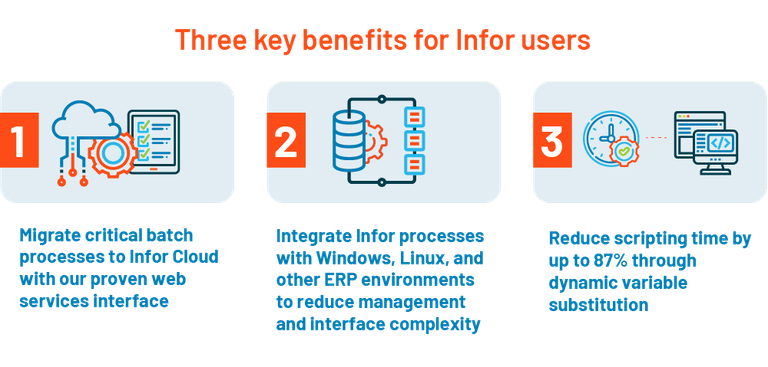Reduce scripting time and simplify management of Infor M3 jobs
Infor M3 has a poor native monitoring and management system. OpCon automation can make it easier by reducing scripting time up to 87% and implementing comprehensive alert and resolution workflows.
Why you should replace the basic Infor M3 scheduler
The native M3 scheduler kind of reminds us a bit of the IBMi AJS. It's functional for very basic things...but the demands of modern IT processes simply outstrip its capabilities. One of the issues is facing users is when they need to run one program multiple times with different parameters. The end user has to duplicate jobs and create new versions of programs with the alternate set of parameters. The more programs and parameters you have, the more needlessly complex the system becomes.
Version management alone becomes an extremely tedious job that consumes enormous amounts of valuable operator time, while also leading to more frequent mistakes. Mistakes lead to missed jobs, missed jobs can lead to missed deliveries, and missed deliveries cost you money.
The native scheduler also doesn’t manage dependencies very well, particularly when you have multiple instances of Infor M3 running and need those different instances to interact with other Infor modules and components, or other applications within your IT system. Printing and file integration/movement between Infor modules are pretty typical use cases but integrating with logistics and retail programs is also critical.

A better scheduler to reduce Infor M3 job scripting time
One of the biggest challenges facing Infor operators is that while it’s a powerful business tool, from a technical perspective it’s a bit messy. It simply takes too long to make changes and keep track of all the versions, and the modern manufacturing and distribution industries are unforgiving of companies that can’t move fast.
Dynamic variable substitution is the answer. We mentioned the frequent requirement to run a single program with multiple sets of parameters, and how Infor presents the option of creating multiple versions of a program to accomplish that goal. There is a much more elegant way of accomplishing this goal. Rather than create all those different versions of the program, OpCon can take one version of a program and automatically insert new parameters into it, as defined by the user. Helpsystems cannot do this, in case you were wondering.
Dynamic variable substitution not only makes it much faster to run different schedules, it makes your employees really happy when they don’t have to rush to change job definitions or manage version control. Since it’s done automatically, it also greatly reduces the chances of manual errors.
Managing cross-dependencies in Infor M3 environments
As previously touched on, programs that run on M3 often have cross-dependencies with other systems. The native Infor scheduler doesn’t manage it well because it’s not really geared to orchestrate jobs and workflows outside of singular instances of M3. This where a solid workload automation platform really shines.
A workload automation (WLA) platform is a modern evolution from the batch job schedulers of old, with REST APIs, web interfaces, and robust capabilities to run processes for almost any application, whether it’s a 30 year old IBM mainframe or a cutting-edge app deployed on a Kubernetes cluster.
By replacing your scheduler with a WLA platform, you gain access to flexible and granular scheduling options, along with highly capable monitoring, management, and deployment features. A modern WLA can execute your Infor processes for all of your Infor environments while passing real-time data and status updates to other ERPs and applications within your global enterprise. Particularly for business intelligence and financial teams, information has to be timely and accurate in order to be useful in the moment of greatest impact.
In addition to those capabilities, the WLA platform won’t simply stop working if a single job is missed. Implementers can set up advanced event-triggered workflows to take whatever action they deem appropriate. This can be the form of triggering an alert and emailing the on-duty team, or it could trigger a resolution workflow to take the appropriate steps necessary to fix the issue. All of this can be done automatically, freeing up the team from needing to address every minor issue, and ensuring that the schedule executes faster and to a higher standard of accuracy.
We hope you enjoyed this blog. SMA Technologies has a very robust and capable solution for organizations that are facing challenges with the management of their Infor M3 environments. If you're interested in improving the functionality and performance of your Infor M3 implementation, we'd love to have a conversation with your team to see how we can help you.
In this article
Learn why you should replace your Infor M3 job scheduler and what you should look for in a new solution.
